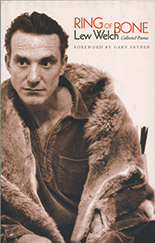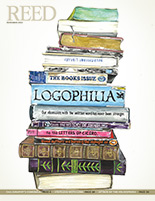
IRIS login | Reed College home Volume 91, No. 4: December 2012
Reediana
Ring of Bone (City Lights, 2012)
Lew Welch ’50
Reviewed by Bill Donahue

“I want the whole thing,” wrote poet Lew Welch:
the moment
when what we thought was rock, or
sea
became clear Mind.
Lew was on the ultimate beatnik quest, searching for Zen unity and for clarity of vision, and he spent his entire life, all 45 restless years, chasing after his elusive Grail. A lean and graceful ladykiller, a rangy redhead and one-time track star, Welch did LSD on Stinson Beach with Gary Snyder ’51. He road-tripped with Kerouac. After a brief, disastrous stint as an advertising copywriter, he drove taxis and school buses and found himself, over and over, lonesome and drunk, trying to remake himself as he wandered, sadhu-like, from a hermit’s cabin in the Trinity Alps of California, to San Francisco, to a job on the docks in Vancouver, Washington. Finally, in 1971, depressed and visiting Snyder’s northern California home, he wrote a suicide note and retreated to the woods with a revolver. He left behind just three slim volumes of poetry, a few scattered songs, some essays, some drawings, and a mishmash of unfinished work.
Luckily, City Lights Books has just published Ring of Bone, a thick collection of Lew’s work. The book is a feast of lucid language and holy insight, even if it is at times sloppy in the way of beatnik bacchanals. Consider “I Saw Myself,” in which the poet stoops over a glassy mountain creek, to behold his own angular face:
I saw myself
a ring of bone
in the clear stream
of all of it
and vowed,
always to be open to it
that all of it
might flow through.
Wonder prevails here, even when life stings. In “Anecdote of Tangerines,” Lew decides to spend his last 15 cents on eight tangerines—a gift for the young lady he’ll see that evening. But then, once he visits the fruit stand, things sour: “the son of a bitch slipped 4 spoiled ones in/and the girl phoned up/breaking the date.” Lew eats the tangerines himself:
alone in my room
spitting the seeds into a dish.
They were sweet.
Another poem, 19 words long and called “The First Warm Day of The Year,” is meanwhile a happy riff that ends with a wise, pain-acquainted moment of revelation:
Hundreds of us, haunch to haunch on
every bench in
Central Park
eyes closed, faces pointing
at the Sun, we’re
turning
as the Sun turns.
The words here are never fancy. Lew didn’t see poetry as a rarefied venture; it was, rather, about grabbing words out of the American air. In one late essay, he calls language “the din of a Tribe doing its business. You can’t control it,” he says,” you can’t correct it, you can only use it as it is.” The art comes in the listening, and when cabbie Lew drives a contented postman home from a parade, his ear is spot-on. “I carried/the American Flag,” the poem ends. “It looked real/nice.”
Ring of Bone goes astray when it endeavors, as so many admiring posthumous collections do, to include almost every scrap Lew ever wrote, including, as editor Donald Allen describes it, “fragments cannibalized from long philosophical poems . . . never completed to [Lew’s] satisfaction.” These bits beg to be skimmed, and Lew’s songs, rendered here in the poet’s own cramped handwriting, are likewise not destined for the next Reed College sing-along.
Still, there is something behind Allen’s inclusion of 50-odd uncollected poems, for they show Lew’s great, troubled mind at work, and here and there they give off flashes of brilliance. In one of the last poems—“The Wanderer,” written in 1970—Welch frets over his own waywardness and then essays a diagnosis: “Perhaps he was only born/upside down, or with eyes turned in the wrong/direction.” He wrings his hands with self-reproach, but then in just two tiny words he apprehends the focus and purpose he carried through his short, ragged life. The final stanza reads:
Forgive me for being so stupid
for taking too much time
to see.


LATEST COMMENTS
steve-jobs-1976 I knew Steve Jobs when he was on the second floor of Quincy. (Fall...
Utnapishtim - 2 weeks ago
Prof. Mason Drukman [political science 1964–70] This is gold, pure gold. God bless, Prof. Drukman.
puredog - 1 month ago
virginia-davis-1965 Such a good friend & compatriot in the day of Satyricon...
czarchasm - 4 months ago
John Peara Baba 1990 John died of a broken heart from losing his mom and then his...
kodachrome - 7 months ago
Carol Sawyer 1962 Who wrote this obit? I'm writing something about Carol Sawyer...
MsLaurie Pepper - 8 months ago
William W. Wissman MAT 1969 ...and THREE sisters. Sabra, the oldest, Mary, the middle, and...
riclf - 10 months ago